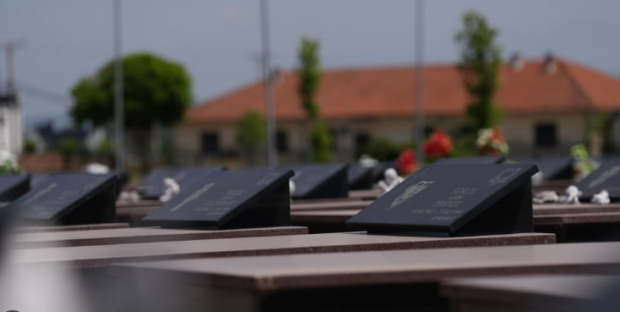
Foto: RFE/RL
The courtroom in Pristina was empty at the start of the trial for a war crime committed by Serbian military and police forces in Kosovo 25 years ago.
The defendants have been tried in absentia since mid-June because they are inaccessible to Kosovo institutions and an international arrest warrant has been issued for them.
In the meantime, official Belgrade has remained silent.
The Serbian army claims to Radio Free Europe (RSE) that it “has no information” about its members in the Kosovo indictment, while the police are not answering questions.
More than 50 defendants, including former leaders of the Serbian military and police forces, are accused of murdering 370 Kosovo Albanians in Meja and other villages around Đakovica during the 1999 war.
A quarter of a century after the massacre, most of the defendants are retired and no official investigation is underway against them in Serbia.
Some are active in public life – writing and promoting books, engaging in politics and appearing in the media.
In its search for the accused, RFE/RL analysed publicly available databases and archives.
What happened in the villages near Gjakova?
According to the indictment of the Kosovo Prosecutor’s Office, as well as previous rulings by the Hague Tribunal, from 27 to 29 April 1999, Serbian military and police forces carried out a large-scale joint operation called “Reka”, named after a valley with more than 20 villages in the Gjakova region.
In this operation, aimed at ethnically cleansing the area and its inhabitants, 370 civilians were killed and several thousand were deported to Albania.
Their property was looted and their houses burned.
Most of those killed lived in the mountain villages of Meja and Korenica.
The bodies of most of them were found in 2001 in eight mass graves in the suburbs of Belgrade, and 18 victims of the massacre are still missing.
Operation “Reka” was conceived by the Prishtina Corps of the Yugoslav Army and the leadership of the Ministry of the Interior (MUP).
Main suspect of the ‘opposition’ in Niš
“It doesn’t occur to me that I would go to trial in Prishtina, but I would always appear before a court in Belgrade,” Momir Stojanovic, former chief of security of the Prishtina Corps and the main suspect in the Kosovo indictment, told RFE/RL.
The retired army general lives in Niš in southern Serbia.
Until 2016, he was an official of the ruling Serbian Progressive Party, but today he is, as he says, “a genuine oppositionist” and a harsh critic of President Aleksandar Vučić.
In the 2020 local elections, he led the civic group “Sincerely for Niš”, which did not cross the threshold.
Stojanovic told RFE/RL that he only heard about the massacre in Meja and other villages years later in The Hague, where he was a witness for the defence in the trials of Serbian military and police leaders.
“I have no knowledge of the suffering of these civilians and I can responsibly say that the army had nothing to do with this crime. I cannot say whether the members of the Ministry of Interior did anything, that is a question for them”, Stojanovic said.
He adds that the Hague court “irrefutably found that he was not responsible”.
“During the Kosovo war, I did not command a single soldier, nor any operation, nor did I plan any operations. My task was to collect information on the strength, composition and location of the terrorist formations of the KLA (Kosovo Liberation Army) and their illegal border crossings.” Stojanovic further states that the Pristina Corps Command planned Operation “Reka” in order to “cleanse” the Gjakova region of terrorists. “In ’98 and ’99, many of our soldiers from this area were killed when they went to work at the guard post (on the border with Albania). Whenever our vehicle drove off, the OVK terrorists ambushed and killed some of the soldiers. This happened for several days,” Stojanović claims.
What did the Hague Court find?
Although senior Serbian military officers claimed in their testimony in The Hague that the aim of Operation “Reka” was to prevent the entry of KLA fighters from Albania from joining the brigade operating in the valley, the court found that none of those killed were armed or actively participating in the fighting.
“Moreover, there is no evidence that any fighting between Serbian forces and the OVK took place in the area at that time,” the ruling against Vlastimir Đorđević, head of the Public Security Department of the Ministry of the Interior, said.
Almost the entire Serbian military and police leadership has been convicted in The Hague for crimes committed during Operation “Reka”.
In addition to Đorđević, the commander of the Pristina Corps, Vladimir Lazarević, the commander of the 3rd Army, Nebojša Pavković, the Chief of the General Staff, Dragoljub Ojdanić, and the head of the Serbian Ministry of the Interior for Kosovo, Sreten Lukić, were also convicted.
To date, no one has been convicted in Serbian courts, either for the crimes of Operation Reka or for hiding the bodies of the victims in the mass graves in Batajnica near Belgrade.
The Hague has not investigated Stojanovic’s responsibility because he has not been tried before that court.
In its judgement against Vlastimir Đorđević, the Chamber stated that Stojanović’s claim that he did not have the authority to command the troops “was neither reliable nor credible”.
“It is inconceivable that he would not have had information about the participation of the troops in Operation ‘Reka’, which was allegedly directed against terrorists, or about the forced expulsion and killing of villagers on the days when the operation was carried out,” the ruling reads.
Stojanovic reiterates his earlier claims to RFE/RL that he learned about the mass graves in Batajnica, where the bodies of the victims were found in 2001, from the media.
Although he later held the position of head of the Military Security Agency, he says he did not carry out the investigation because he “did not receive such a request from the judiciary”.
As a member of the Serbian Progressive Party, Stojanovic has also chaired the Parliamentary Committee for Oversight of the Security Services since 2014.
While he was there, Interpol issued a red notice for him and 17 others for crimes in the Gjakova region. “I immediately turned myself in to our special war crimes court in Belgrade. The investigation lasted until 2019, three prosecutors changed, and then they issued a decision to reject the complaint,” says Stojanović.
The War Crimes Prosecutor’s Office did not respond to RFE/RL’s questions about why the investigation was suspended, or what information they have about the massacre and the subsequent transfer of the bodies of those killed, evidence of which has been submitted to the Hague Tribunal.
Who was involved in the crime?
According to the indictment, the army committed the 549th Motorised Brigade – 2nd Battalion, the 125th Motorised Brigade, the 63rd Parachute Brigade, the 52nd Military Police Battalion and the 52nd Artillery and Rocket Brigade to the operation.
The Ministry of the Interior deployed, inter alia, special police units from Gjakova and Prizren, a special operations unit established by the Serbian State Security Service, as well as members of the Territorial Defence and paramilitary formations.
Recognition for the ‘heroic’ 125th Brigade
The Kosovo indictment also includes Dragan Živanović, who commanded the 125th Motorised Brigade at the time of the crime.
In his testimony in The Hague, he had previously claimed that his brigade had not taken part in the looting and burning of villages in Kosovo and that his soldiers had “only targeted buildings where terrorists were present”. He retired in 2006 with the rank of Major General.
Today, he is a guest on national television programmes, talking about the events in Kosovo and the “heroic journey” of the former brigade.
Together with the Serbian military and state leadership, he has awarded several decorations to its members.
The entire brigade, which was disbanded in 2005, was awarded the “Order of the National Hero” for, according to the Serbian army’s website, “contribution to the defence of the homeland, heroism and sacrifice”.
In 2021, the Ministry of Defence also presented the film “The Heroic 125th Motorised Brigade”.
According to the Centre for Humanitarian Law, more than 1 800 civilians, including more than 500 women and children, were killed in the area of responsibility of this brigade.
The Centre filed two criminal indictments against Zivanovic for crimes in Kosovo more than a decade ago.
In 2014, the Serbian Prosecutor’s Office opened an investigation into the brigade’s involvement in the crimes.
It was suspended three years later, and the prosecution did not respond to RFE/RL’s questions about the reasons.
Memoirs of the victims’ families
Mira Krasniqi’s husband was one of the hundreds of civilians who were taken from their village near Gjakova by Serbian forces on 27 April 1999. He was 39 years old and his body was never found.
Mira remembers columns of women and children, men separating them, streets full of Serb soldiers and their orders with guns: “Run, get out”.
“The first one they took off the tractor was Albert – my brother-in-law’s son. Then they took all the other men.
They wouldn’t even let us turn our heads to look at them. We continued with the convoy towards Albania,” Mira recalled in an interview with RFE/RL.
Albert Krasniqi, then 17 years old, and his father were found in one of the mass graves in Batajnica.
Lush Krasniqi, from Ramoc near Gjakovo, lost two brothers and an uncle that April day.
“They were taken to other houses and we were ordered to leave with a tractor,” recalls Lush.
The bodies of his family members were found six years later, also in one of the mass graves in Batajnica.
What do the veterans of the 63rd Parachute Brigade do?
At the time of the crime, the 63rd Parachute Brigade was led by Ilija Todorov.
He remained in this position until 2006, when he was appointed the first commander of the Special Brigade of the Serbian Army.
He was also Deputy Commander of the Joint Operational Command and retired in 2020.
Unlike some of the veterans of this brigade who have participated in the anti-government protests by students and citizens in Serbia in recent months, Todorov is close to the state and military leadership.
Last October, he, along with then Prime Minister Miloš Vučević and Defence Minister Bratislav Gašić, spoke at the 80th anniversary ceremony of the brigade.
“Today is an opportunity to express our gratitude and pay tribute to all those who joined the great movement of the 63rd Parachute Brigade,” he said.
This brigade was also awarded the “Order of the People’s Hero” in Serbia.
According to the findings of the Hague Tribunal and the testimony of military personnel, the 63rd Parachute Brigade was on the left flank of the military-police forces moving from the north-west of the Reka valley to the south-east, driving out the villagers.
During the Kosovo conflict, this brigade was mainly employed in guard posts on the border with Albania.
‘General’s Kosovo Road’
The former commander of the army’s 52nd Artillery and Rocket Brigade, Miloš Đošan, has been retired since 2001.
He writes and promotes books on the war in Kosovo and is a frequent guest on Serbian television.
Last March, at the launch of the biography of Nebojša Pavković, he said that “it is a great honour and responsibility for me to speak about a book of heroes and martyrs”.
Pavkovic is serving a decades-long prison sentence in Finland for crimes in Kosovo.
In addition to promoting his books “General Kosovo’s Path” and “From NATO Aggression to the Hague Tribunal”, Miloš Đošan also takes part in ceremonies organised by government representatives.
At the time of the crimes, the Đoshan Brigade was directly subordinate to the Priština Corps.
In a statement to the Commission for Cooperation with The Hague in 2002, he confirmed that part of his unit had taken part in Operation Reka, but that it had not come into contact with civilians.
As a defence witness at the trial of Vlasimir Đorđević in The Hague, he claimed that he “did not have much information about the operation” and that he had “not heard anything about the crimes” committed against the Albanian population.
Area of responsibility of the 549th Brigade
The villages in the Đakovica area fell within the area of responsibility of the 549th Motorised Brigade, led by Božidar Delic.
Despite the allegations and criminal charges brought against him by the Centre for Humanitarian Law, Delić was never prosecuted in Serbia.
He died in August 2022. At the time, he was Deputy Speaker of the Serbian Parliament.
In terms of its strength and the operations in which it participated, the most important battalion within the 549th Brigade was the 2nd Motorised Battalion, commanded by Vlatko Vuković.
As a defence witness at the trial of former Yugoslav President Slobodan Milosevic in The Hague, Vuković claimed that his battalion had received verbal orders from the Pristina Corps to “help civilians cross the border and go to Albania”.
The reason he gave was “to prevent the possibility of injury from mines planted by Serbian forces”.
Vukovic, who is on trial in Kosovo, retired in the early 2000s.
This brigade was also awarded the “Order of the People’s Hero” in Serbia “for its war services”.
According to the testimony of several senior military officers in The Hague, the order to commit the army to Operation “Reka” was given by the then Chief of Staff of the Pristina Corps, Veroljub Živković, who issued a verbal combat order to the units “to secure the area”.
Zivkovic was indicted by the Kosovo Prosecutor’s Office and, according to the Humanitarian Law Centre, was dismissed from his post in 2003.
According to the indictment, a company of the 52nd Military Police Battalion, led by Saša Antić, also participated in the crime.
According to a statement by a member of this battalion, who testified in The Hague under identity protection, the order for the deployment of the company was issued by the battalion commander, Stevo Kopanja, stating that all Albanians were to be sent to the village of Korenica, where they were to be met by members of the Ministry of Interior “with a list of terrorists”.
According to the Fund, Kaponja retired in 2013 and Saša Antić in 2002.
The role of special police and paramilitary formations
The indictment also includes members of the special police units and the special operations unit led by Franko Simatović.
He is also in Serbia after the Hague Court granted him early release in 2023 on grounds of ill health. He has served eight and a half years of a 15-year prison sentence for crimes committed during the wars in Bosnia and Herzegovina and Croatia in the 1990s.
He was not held responsible for the crimes committed in Kosovo.
No response from the institutions
The Serbian Ministry of Defence has refused to provide information on its members indicted in Kosovo on the grounds that the Directorate General Staff Operations “does not have the requested information”.
Until the publication of this article, the Ministry of the Interior had not responded to RFE/RL’s request for free access to information of public importance, even though the legal deadline had already passed.
The War Crimes Prosecutor’s Office did not respond to questions about whether it would launch an investigation or cooperate with Pristina once the Kosovo trial has started.
The Ministry of Justice also did not respond to a request for information on the mutual legal assistance agreement.
This agreement, reached in Brussels in 2013, provides for Serbia and Kosovo to exchange judicial requests through representatives of the European Union.
The Serbian government, which does not recognise Kosovo and its institutions, has not publicly commented on the opening of the trial in Pristina.
The President’s Office, the Prime Minister’s Office and his Office for Kosovo did not respond to RFE/RL’s questions.
Sources: Judgments and testimonies in the trials of Vlastimir Đorđević and the so-called Kosovo Five before the International Criminal Tribunal for the former Yugoslavia; Humanitarian Law Centre files – “Operation Reka”, “125th Motorised Brigade” and “549th Motorised Brigade”./Rferl/

 NATO must go on the offensive against Russia
NATO must go on the offensive against Russia 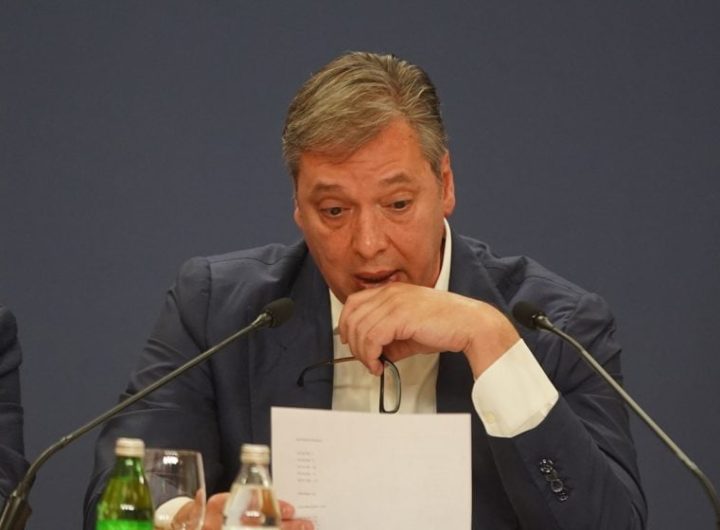 Will Serbia lustrate Vučić and his team after they fall from power?
Will Serbia lustrate Vučić and his team after they fall from power?  Trump lobbies EU for 100% tariffs on China and India
Trump lobbies EU for 100% tariffs on China and India 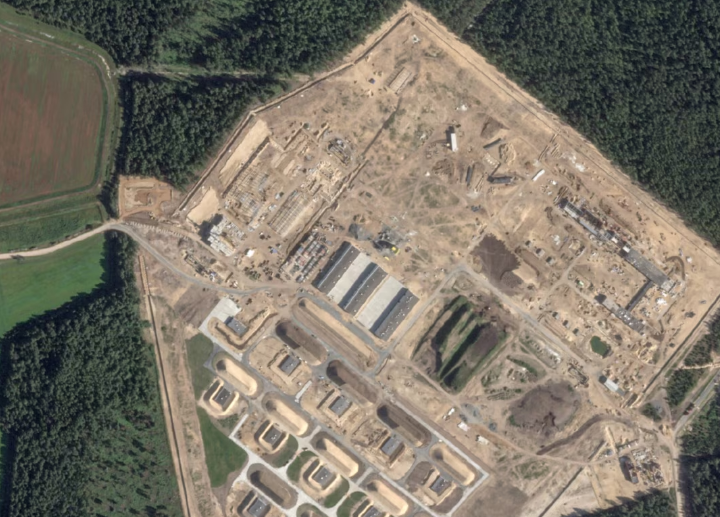 Satellite Images Appear To Show Secretive Construction Of ‘Strategic’ Base In Belarus
Satellite Images Appear To Show Secretive Construction Of ‘Strategic’ Base In Belarus 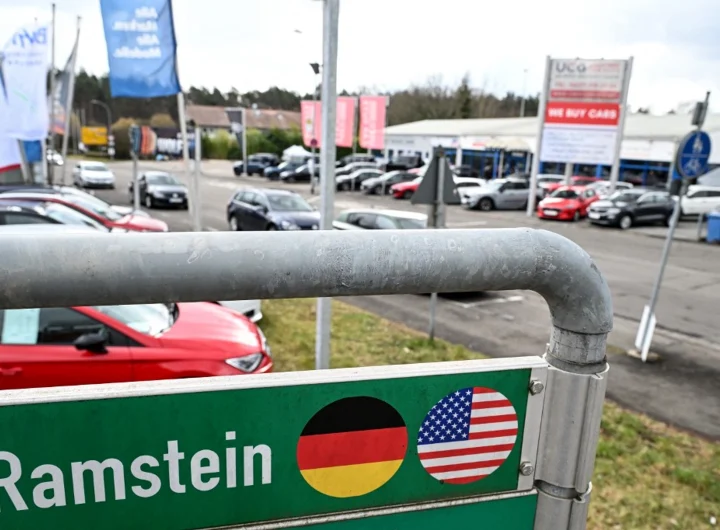 ANALYSIS: Russian Spy Drones Stalk NATO Supply Lines in Germany
ANALYSIS: Russian Spy Drones Stalk NATO Supply Lines in Germany 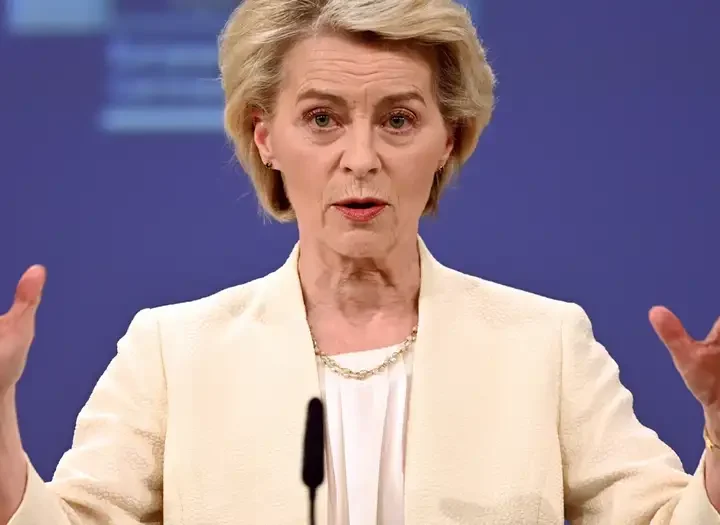 Russia stirs up hate against von der Leyen amid Ukraine war
Russia stirs up hate against von der Leyen amid Ukraine war